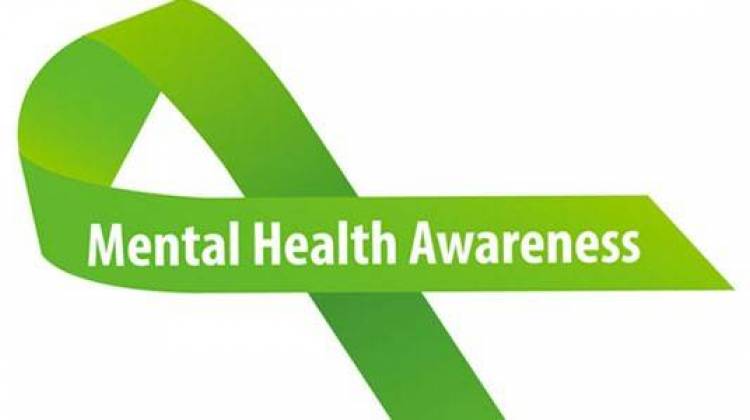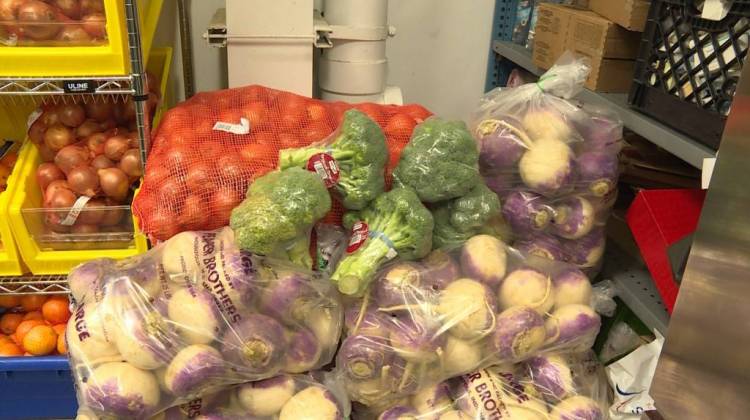FISHERS -- National statistics show that about one quarter of Americans suffer from mental illness in a given year, but around half of those people will not seek treatment, in part, because of stigma.
A new effort to fight stigma is happening in a northern suburb of Indianapolis.
On a warm Saturday morning at the Fishers Farmers Market dozens of people are buying fresh produce and baked goods, listening to music, talking to friends … and some of them are stopping by a table set up by the city to take a stigma free pledge.
The mental health initiative was started in Fishers a year ago, after Mayor Scott Fadness had a ride-along with a police officer and asked him what calls concerned him the most.
"And he said 'Well it’s ID’s,' and I was like 'What are you talking about driver’s license,'" Fadness said. "He said ‘No, it’s immediate detentions’ and I thought what do those mean and he said it’s when we get taken to a call and someone is in such duress that they are going to do immediate harm to themselves or someone else."
He says he started looking at the data.
"And every Monday I read these intelligence reports that literally say five people tried to commit suicide last week, or seven people… two were successful… ages ranging from 9-years old to 27-years old," Fadness said.
This spurred him to create a task force of school, health, public safety and city leaders to explore mental health issues. Fadness says, in the past year, the group has clearly identified stigma as a barrier to care.
"In Fishers these are people living in quiet despair," Fedness said. "You wouldn’t know that they have depression. The woman who shoots herself on Tuesday night, that day probably went to work."
After a year-long assessment the Fishers Mental Health Task Force is now working to coordinate care, increase training and reduce stigma. And that last aim – reducing stigma – is trending across the country right now.
Distinguished Professor of Sociology at Indiana University, Bernice Pescosolido says anti-stigma campaigns are on the rise, but the trend won’t have an impact if it doesn’t become the standard.
"I think the research is pretty clear, that the only way to move the needle is to have a national, integrated, multi-level, long time effort," Pescosolido said.
A 2007 stigma study from the Centers for Disease Control and Prevention found over half of respondents believed people were sympathetic to people with mental illness, but only 25 percent of adults with mental health symptoms agreed with that statement.
Executive Director of the National Alliance on Mental Illness or NAMI in Indiana, Josh Sprunger said many don’t seek help because of these misconceptions.
"Stigma is a part of that, breaking down that self-stigma early and giving people education about what mental illness is -- it’s biological, it’s treatable, recovery is possible," Sprunger said. "Then self-stigma is reduced early on."
NAMI started a stigma free pledge last year. Sprunger said a big part of changing the system is treating this as a public health issue.
"If we have local governments, or federal, talking about it in that way that’s a huge part of meeting the community where they are and getting the education they need," Sprunger explained.
Finding out if people are becoming more educated and open and less stigmatized is hard to pinpoint, but Fishers plans to send survey’s to residents.
Back at the Fishers Farmers Market, Mayor Fadness says about one-in-five residents suffer from a mental health condition, and he doesn’t believe his city is unique.
"Every community, I don’t care what demographic, is dealing with this issue today or not dealing with it, but it’s still there." he said.
The Fishers Mental Health Task Force is just getting started and will continue work to close mental health gaps.
 DONATE
DONATE









 Support WFYI. We can't do it without you.
Support WFYI. We can't do it without you.